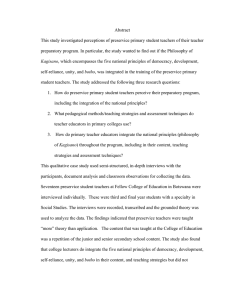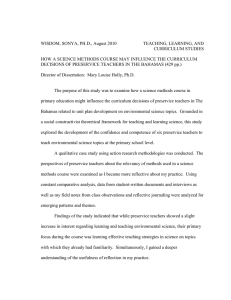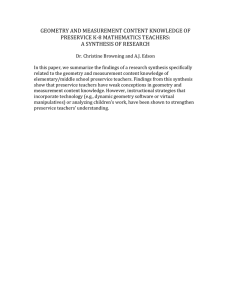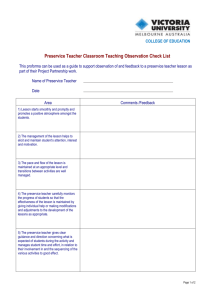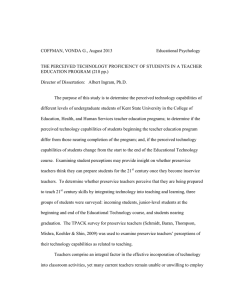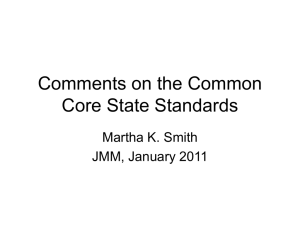Developing Competent and Democratic Professionals
advertisement
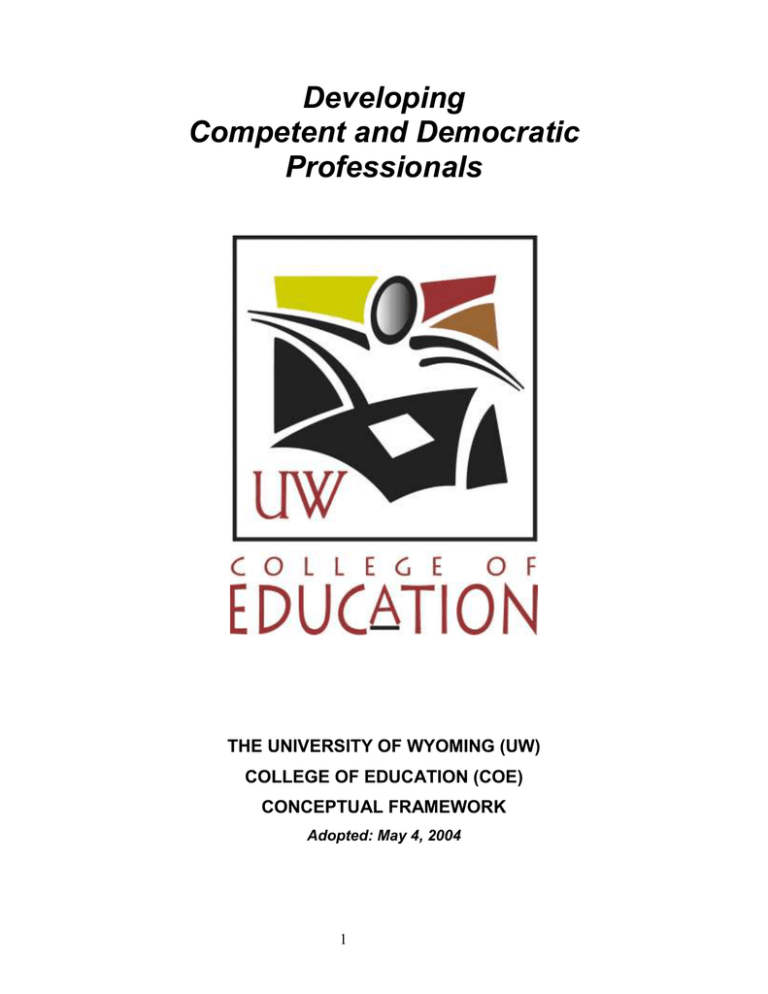
Developing Competent and Democratic Professionals THE UNIVERSITY OF WYOMING (UW) COLLEGE OF EDUCATION (COE) CONCEPTUAL FRAMEWORK Adopted: May 4, 2004 1 Preface The UW COE Conceptual Framework delineates the theories, beliefs, knowledge bases and practices that guide our college, our programs, our research, our courses and our field experiences. This document provides the foundation of our vision for the preparation of P-12 school personnel and lends a structure and direction for us in the implementation of the vision, while allowing us to adapt to unique and unpredictable events that await us. The reader should note that while this document sets this conceptual framework for the UW College of Education, it has been collaboratively developed with input from multiple internal and external constituencies, including faculty in the College of Arts and Sciences and the College of Health Sciences, K-12 faculty and administrators from partner schools and from the Wyoming SchoolUniversity Partnership, colleagues in the community college settings, and others. This conceptual framework lays the foundation for the “unit” which is defined as inclusive of all programs which lead to certification or endorsement for any classification of public school personnel. As scholar-practitioners, the UW College of Education faculty recognize the critical roles of our partners in the delivery of professional preparation programs: Outreach, graduate programs, community colleges, etc. We view the conceptual framework and its associated outcomes as a way to link these programs in a common mission while accommodating individuality and supporting innovation. Thus, our conceptual framework is meant to be a living document that is subjected to critical assessment, refinement, and adaptation. We expect to continue to engage in ongoing dialogue with all members of the professional education community within and outside the College and University, so that the conceptual framework continues to be a catalyst for essential debate, reflection, and action. Many partners and a wide variety of constituents have shared in the definition and refinement of this document. We believe that this conceptual framework articulates the congruence we strive for across goals, beliefs, elements of our theme, relevant knowledge bases, unit outcomes, assessments, and course curricula. The Conceptual Framework Our theme, “Developing Competent and Democratic Professionals,” threads through the work we collectively undertake in our teacher education programs and in all the programs delivered in the COE. The theme is intentional in that each piece represents a series of core theories, knowledge bases, beliefs, and practices. The theme is briefly dissected and described here, but by design will continue to unfold and connect throughout this document. 2 Developing Competent and Democratic Professionals Our use of the word developing acknowledges that we wish to help others and ourselves to be constantly working toward the ideal. We wish to be lifelong learners in our chosen disciplines and within our chosen professions. Additionally, the term “developing” implies action and mutual engagement of teachers and learners across many levels. We recognize that we are all developing in our professional competencies and dispositions—and agree that this is indicative of our beliefs. In using the word competent, we are implying that we, and our candidates/graduates, are knowledgeable in the areas and specialties which lead to licensure, certification, endorsement, and/or practice. We recognize the fluid (and disputed) nature of knowledge and knowledge claims, but we also acknowledge that there are “major concepts, assumptions, debates, processes of inquiry, and ways of knowing that are central to the disciplines” (INTASC Principle #1). Education professionals should be able to demonstrate familiarity/competence with these major concepts. Being “competent” is a never-ending process embedded in lifelong learning because “knowledge is dynamic, changing, and constructed within a social context rather than neutral and static” (Banks, 2002, p. 29). Democratic, the next word in our theme, may be both the most ambiguous and most important component. “Tensions of meaning within modern democracy have no single source but are significantly tied to the ambiguity within democracy’s clearest aim: the fundamental value of every human being” (Hoffert, 2001, p. 30). Being “democratic” is no easy task. Barber described democracy as “a polity of strangers and a polity of antagonists and a polity of people who don’t get along, and maybe even don’t share fundamental values, but still have to live together and have to find a way other than the gun or the fist to solve and resolve or live with their differences” (in Smith, 2001, p. 167). We agree with Barber and Hoffert that democracy is a messy, complex process but side with Irvine and Armento in asserting that there are fundamental values that we share. “As members of a democratic society, we share certain core values such as respect for the individual and our common entitlement to liberty, equality, and justice” (2001, p. 22). Roger Soder (Soder, Goodlad, & McMannon, 2001) defines twelve conditions for democracy: trust, exchange, social capital, respect for equal justice under the law, respect for civil discourse, recognition of the need for E Pluribus Unum, free and open inquiry, knowledge of rights, freedom, recognition of the tension between freedom and order, recognition of the difference between a persuaded audience and a more thoughtful public, and ecological understanding. It is the pursuit of these often-unrealized conditions that make practitioners’ “democratic” dispositions essential catalysts for positive social change. In our theme, the use of the term “professionals” is deliberate for a number of reasons. Using the term “teachers” would exclude other education professionals in our unit. Professionals, in our 3 usage, include researchers, counselors, administrators, teachers and professors. Additionally, the term “professionals” implies engagement in a discipline. It also implies a knowledge base to which the professional has a responsibility to understand and, in some way, contribute. Vision In our vision, the COE at the University of Wyoming will be: a place known to deliver respected undergraduate and graduate programs; nationally and internationally recognized for our focus on and achievement of high standards; a place where well-qualified candidates learn to be competent professionals, and skilled in the enculturation of the young into a social and political democracy; a place where everyone is dedicated to conducting research and exploring various meanings of teaching and learning from “multiple” perspectives; a place that demonstrates the belief that all children are valuable, worthwhile individuals who can and want to learn; a challenging yet supportive place; a place that values and models field-based experiences for education professionals. We envision the college as being innovative, student-centered, and able to deliver quality content and pedagogical knowledge designed to develop an informed citizenry capable of maintaining a democracy, respecting humanity, and making informed decisions regarding our global environment and finite natural resources. We further envision the college being a center for collaboration, growth and learning, and focus on democratic ideals; a close-knit community of professionals who model effective teaching, across departmental lines and work together on program design, course delivery, and build a program that is attractive to many constituent groups. Mission – University of Wyoming “…[T]he mission of the University of Wyoming is to provide teaching, scholarship, and outreach programs that compare favorably with programs at the leading land-grant research universities in the nation. In addition, to promote development of the whole person, the University will provide a diverse array of superior co-curricular activities, including cultural, international, athletic, and student-life programs. The University will attract qualified candidates who will provide future leadership for the state and nation, and it will be particularly attentive to the needs of Wyoming students, members of underrepresented groups, and the gifted…” Though abbreviated, this statement represents the basis of the UW mission. Mission – COE The mission of the College of Education is to provide quality education through the development of prospective teachers, counselors, adult educators, and school leaders; to provide continuing educational opportunities for members of those professions; to support inquiry and research 4 which further our understanding and practice of effective teaching and learning; and to provide service to the state and nation through professional partnerships and organizations. Philosophy/Beliefs Fundamentally, we believe that learners construct their own understandings and a responsible professional seeks to help the learner in that endeavor. Our programs incorporate curricula, activities, and assessments that demonstrate a prominent constructivist philosophy. These belief statements encapsulate our collective philosophies related to education, schooling, teaching and learning. 1. We believe all students have the potential to learn rigorous content and achieve high standards. 2. We believe that both content and pedagogical content knowledge are foundational to the preparation of competent democratic professionals. We acknowledge the importance of the existing and emerging research and knowledge bases for the preparation of educators, contemporary science of how we learn, and the critical nature of contextualized practice in our programs. 3. We believe that educators and other school personnel are professionals who rely on deep knowledge bases and broad research which guides our practice. 4. We believe that teaching and learning comprise a holistic process that connects ideas and disciplines to each other and to the personal experiences, environments, and communities of students. Consequently, the process of teaching must be dynamic and reciprocal, responding to the many contexts within which students learn. Such teaching demands that teachers integrate their knowledge of subjects, students, the community, and curriculum to create a bridge between learning goals and learners’ lives. 5. We believe that field experiences in authentic settings with committed partnerships are essential for the preparation of education professionals. 6. We believe that professional educators (ourselves and those we prepare) assume roles that extend beyond classrooms and schools and include responsibilities for connecting to other professionals, developing schools and other agencies as learning organizations, and using community resources to foster the education and welfare of students. 7. We believe that learning is cultural and social and that one of the greatest challenges in educating children and others for the 21st century is the search for a socially-just curriculum that engages all students and brings meaning to their lives (Cochran-Smith, 1991; Oakes & Lipton, 1999). We believe it is the moral obligation of education professionals to strive for the democratic ideal and to advocate for the marginalized, oppressed and underserved. We believe in simultaneous renewal in concert with our arts and sciences and public school partners (Goodlad, 1990; Sergiovanni & Moore, 1989; Smith & Fenstermacher, 1999). Purpose The overall aim of the COE is to assure that successful candidates complete our programs with the knowledge, skills and dispositions necessary to excel in their chosen field. During their preparation they receive excellent instruction from a faculty committed to providing productive and educative learning environments. Candidates demonstrate their proficiency in a variety of settings and levels and leave with confidence in their own ability coupled with a realistic sense of areas for continued growth. Candidate outcomes for the COE are further explicated in a supplemental document that details the Unit Assessment Plan. Candidates realize the value of inquiry and leave with the desire to be lifelong learners in a profession where unforeseen challenges develop. Finally, the purpose of education in the 5 unit is to better candidate lives by helping them understand the responsibilities of living in a democracy and preparing them to contribute to learning in educational settings. These are the purposes to which we are committed. Goals The following seven goals have been articulated by the UW COE faculty in the UW COE academic plan. These goals will be given priority and resources as our college programs evolve through 2009. (Timelines for these goals are articulated in the COE planning document.) 1. Ensure high quality curricula aligned with professional accreditation and certification requirements and legislative mandates including “No Child Left Behind” and the state and federal interpretations of “highly qualified.” 2. Employ a range of effective delivery systems. 3. Increase the visibility and reputation of the COE. 4. Foster a climate that attracts and retains quality faculty and students. 5. Align the COE mission and degree programs with UW’s emphasis on “Professions and Issues that are Critical to the Region.” Clearly, graduates of our degree programs enter professions that are crucial to the economics and the quality of life in our region. 6. Focus on three critical national educational issues confronting education preparation programs: research on teacher education, providing access to quality P-16 education for all learners, and recognizing the importance of early learning. 7. Expand environment and natural resources education - The political will to address the complexities of the environment with responsible resource and land management is increasing in national and global communities. The COE recognizes the need for professional development opportunities for educators who can help address this imperative. Knowledge Bases Each of our programs is guided by unique knowledge bases, theories and research. Some knowledge bases span programs and provide unit coherency. Others are unique to particular preparations in terms of depth and focus. Overall, however, these areas/knowledge bases unify our faculty, candidates, partners and programs. Pedagogical content knowledge – Experiences and methods relevant to specific professional practice (the works of Grossman, Shulman, and others) Theories of learning and knowledge - Constructivism, cognition, cognitive/physical/social development, lifelong learning, knowledge base for teacher preparation (the works of DarlingHammond, Caffarella, Fenstermacher, Knowles, Piaget, Slavin, Vygotsky, and others) 6 Theories of teaching - Instructional strategies, scaffolding, cooperative learning, caring pedagogy, standards-based education (the works of Anderson, Brookfield, Noddings, and others) Democracy and social justice - Education in and for a democratic society that values individual and cultural differences (the works of Banks, Goodlad, Grant, Lee, Nieto, Parker, Sleeter , P. Smith, Soder, and others) Unit Outcomes We have identified three outcomes which unify the unit and the College in mission and purpose, while allowing programs to address specific standards and proficiencies at a more detailed level in their respective program assessment plans. The following three outcomes flow from our theme (Developing Competent and Democratic Professionals). All candidates in all programs in the unit and the COE are committed to meeting these outcomes. Importantly, these three outcomes bind together our unit’s diverse fabric of people and programs. Outcome 1 - competence. Candidates completing our programs will demonstrate their ability to function as competent professionals. Candidates will demonstrate: competence in their specific area(s) to include comprehensive subject matter knowledge coupled with demonstrated pedagogical content knowledge; and respect for and understanding of intellectual and inquiry processes. Outcome 2 - democratic perspectives. Candidates completing our programs will exhibit democratic perspectives and dispositions. Candidates will demonstrate values, beliefs and ethics that include: confidence in the ability of ALL to learn and a passion for making it happen; empathy, understanding and advocacy for others, including cultural, socioeconomic, and ethnic backgrounds different from their own; an understanding that democratic responsibility requires active participation; and a desire to collaborate with others. Outcome 3 - professionalism. Candidates completing our programs will document their aptitudes as professionals in their fields. Candidates will demonstrate and produce evidence that documents: practice with multiple approaches to teaching and learning; knowledge of how to plan and organize instruction and clinical/professional practice to positively benefit all students, including those with special needs; an understanding that underlying theories influence pedagogical and practical decisions; and 7 competence in using assessment and reflection to guide future practice and decisions. Aligned Candidate Proficiencies Initial teacher preparation programs. The UW faculty collaborated to define these College of Education Teacher Education Program Content and Performance Standards. They represent the result of many hours of broad-based discussions and incorporate principles from the National Network for Educational Renewal (NNER), the INTASC standards, the NCATE standards, and the state standards set by the Wyoming Professional Teaching Standards Board (PTSB). All preservice candidates are expected to meet these standards at a Proficient level prior to completion of their teacher education program. Standard 1: DISCIPLINE KNOWLEDGE The preservice teacher understands the central concepts of the discipline(s), the tools of inquiry used in the discipline(s), the structures of the discipline(s), connections among disciplines, and the importance of presenting multiple perspectives and representations within the discipline(s). The preservice teacher uses these understandings to create learning experiences for students that make these aspects of the discipline(s) meaningful to students. Standard 2: DEVELOPMENTAL THEORIES The preservice teacher has knowledge of human cognitive, social, physical, emotional and moral development and understands how these factors influence learning. The preservice teacher understands the importance of teacher observation of students to gauge developmental abilities; sees development as both a socio-cultural and biological phenomenon. Although the preservice teacher understands the limitations of developmental theories, he or she is capable of forming a developmentally responsive pedagogy. Standard 3: DIVERSE LEARNERS/DIFFERENTIATED INSTRUCTION The preservice teacher understands that schools are comprised of diverse learners who differ in their approaches to learning and that there are multiple theoretical models for understanding and addressing students’ differences. He or she plans instruction with the assumptions that all students can learn and employs instructional methods in ways that connect learning with the students’ diverse experiences and needs. The preservice teacher cultivates a mutually respectful learning community that values all students. Standard 4: INSTRUCTIONAL STRATEGIES The preservice teacher understands, employs, evaluates, and adjusts a variety of instructional strategies using a wide range of instructional materials and technology in order to achieve learning goals for all students. The preservice teacher understands and applies multiple instructional strategies, learning theories, and cognitive processes associated with types of learning. Standard 5: DEMOCRATIC LEARNING ENVIRONMENTS The preservice teacher works to facilitate purposeful classroom and school learning environments that foster social interaction, active engagement, and collaboration. The preservice teacher uses knowledge of the historical, social, and political roles of schooling in the U.S. to ensure equity for all children, especially given the relationship between schooling and the reproduction/mitigation of inequalities in the broader society. The preservice teacher supports students to become critical participants in a democratic society grounded in principles of social justice, especially in the development of mutual respect, support, and critical inquiry in the classroom. She or he is competent in behavior management that is reflective of the needs and practices of diverse students. This competence includes classroom management skills, intervention strategies, motivational techniques, and monitoring and documenting student behavior. He or she critically reflects on personal history, beliefs, values, biases in relation to and as an agent of change within school and society. Standard 6: COMMUNICATION TECHNIQUES The preservice teacher understands effective communications strategies and the role of language in learning; models effective communication (including writing, speaking, and listening) using a variety of communications tools; and demonstrates sensitivity to economic, cultural, and gender differences in communication. She or he uses effective questioning and other discourse strategies that promote learner understanding and encourage 8 convergent and divergent thinking. The preservice teacher uses, and facilitates the use of a variety of media communications tools and technology to enrich learning opportunities. Standard 7: PLANNING The preservice teacher can select and create appropriate learning experiences based upon principles of effective instruction, both as an individual and team member. The preservice teacher considers the following factors when planning for short and long-term learning: individual nature of the student; national, state, and district standards; curriculum goals; subject matter; assessment; instructional strategies; learning theory; student development; and learning styles. He or she evaluates plans and makes systematic adjustments as needed to address needs of the class and individual needs of diverse learners. The preservice teacher’s planning includes critically evaluating, adapting, and incorporating a variety of commercially and teacher-made materials to enhance instruction. Standard 8: ASSESSMENT The preservice teacher understands, selects, constructs, and uses a variety of assessment methods and strategies such as standardized, performance-based, individual, whole group, self, peer, and teacher evaluations. The preservice teacher understands issues related to the accuracy of assessment results. She or he uses assessment in conjunction with students’ experiences, learning behaviors, and parent reports to guide instruction, promote student growth, and for documentation. The preservice teacher understands tools of assessment, appropriate use of tools, relationship of instruction and assessment, and assessment issues. Standard 9: REFLECTIVE PRACTITIONER The preservice teacher demonstrates self-assessment, individual and collective inquiry and life-long learning traits to support personal growth and professional development. The preservice teacher accesses resources such as literature, colleagues, observations, and/or classroom data to support her or his growth and development and that of colleagues. The preservice teacher recognizes his or her abilities to influence the teaching profession and collaboratively affect changes in the system by taking responsible action. Standard 10: FOSTERING RELATIONSHIPS The preservice teacher fosters relationships with school colleagues, parents, and others in the larger community. The preservice teacher cares about all students’ well-being; as a result the preservice teacher understands and implements relevant laws and consults regularly and in respectful, productive ways with all stakeholders. He or she understands and appreciates that factors outside school influence students’ lives and learning and is an advocate for students. Advanced programs. Our advanced preparation programs assess candidates on standards and proficiencies set forth in their respective program assessment plans. Graduate programs are aligned with relevant state and/or specialty professional association (SPA) standards. One example of such alignment is evident from the eight-year accreditation earned for the M.S. School Counseling and the Ph.D. Counselor Education and Supervision from the Council for Accreditation of Counseling and Related Educational Programs (CACREP) valid through March 31, 2012. Initial Preparation Program Assessment System. The outline of this assessment system is based on the three unit outcomes and is implemented with assessments at identified critical junctures of the initial teacher preparation program. With each critical juncture portion of the program, specific standards, elements of standards and assessment data are collected. The assessment system runs through the teacher education programs to the course level where (explicated in other documents) a series of “common assessments,” coupled with rubrics, provide the foundation of candidate assessment. In sum, assessments provide documentary evidence 9 that all candidates are meeting the performance standards identified in the assessment plan. These data will be archived in an electronic portfolio system that shows evidence of progress related to preservice teachers’ knowledge, dispositions, and performance/teaching abilities. Rubrics (except for the Dispositions Rubric) are developed to reflect these levels: Novice, Basic, Proficient, and Exemplary. Advanced Preparation Programs Assessment Systems. Each advanced program has developed a program assessment plan that identifies the standards, critical junctures, assessments, evaluation criteria, and data collection methods and timelines for that program. These assessment plans also document how candidate performance data is analyzed and used to inform changes at the program level. Aggregated assessment for continuous improvement. In addition to collecting the usual sorts of candidate statistics (course enrollments, average grade given, time to degree completion, survey data and candidate demographics), we are aggregating data from our common assessments, rubrics, and other unit assessment system requirements. These aggregated data sets allow us to review our programs for gaps, duplications, and to inform decisions about program revisions. The assessment system, as supported by the electronic portfolio, allows us to monitor candidate performance and progress individually, by critical juncture, or collectively. Our courses and content are not static. Our assessment systems (for initial and advanced programs) provide us data-based directions for positive evolution and continuous improvement. 10
